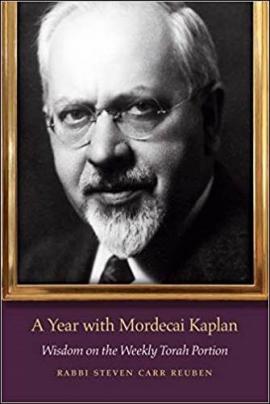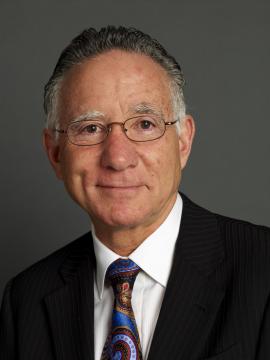
Register now for a September 10, 2019 webinar with the author!
A Year With Mordecai Kaplan: Wisdom on the Weekly Torah Portion is the latest book by Rabbi Steven Carr Reuben, Ph.D. Rabbi Reuben has been a leading voice in the Reconstructionist movement for decades. He serves on the board of Reconstructing Judaism, and recently become Rabbi Emeritus of Kehillat Israel Reconstructionist Congregation of Pacific Palisades after 28 years as Senior Rabbi. Considering his biography, it is no surprise that Rabbi Reuben’s book is a “deeply rooted and boldly relevant” commentary on the weekly Torah portions. In each commentary, Reuben begins with an interpretation of the parasha (portion) that focuses on a particular theme or element in the text. These reflections weave insights from traditional and contemporary commentators with Reuben’s own insights. He then introduces the reader to a nugget of Rabbi Mordecai Kaplan’s thought or writings that intersects with the theme. Mordecai Kaplan was the founder of Reconstructionist Judaism and his thought and writings continue to inform the ever-evolving Reconstructionist approach. Reuben concludes each section by sharing an experience from his own rich life and career that illustrates the theme as it manifests in real life situations. As he notes in the introduction, Rabbi Reuben does not intend for readers to read the book cover to cover. Rather, he invites us to read it as we read Torah — in weekly encounters, focusing on whichever piece calls to us in that moment.
In his commentary on Va’etkhanan (Deuteronomy 3:23-7:11), Reuben focuses on the function of the words of the shema in their biblical context and in Jewish practice. He summarizes his discussion saying “in essence, the Shema is the spiritual glue binding the Jewish people together in their commitment to seeing Adonai as the one true God.” He concludes with a brief discussion of two rabbinic comments regarding the recitation of the shema. “Reciting it, they [the sages] believed, was one of the most important ways of fulfilling the commandment to love God ‘with all your heart and with all your soul and with all your might.’”
The next section plunges the reader into Mordecai Kaplan’s bracing and, for its time, radical theology. He quotes Kaplan as saying:
We shall not come to experience the reality of God unless we go in search of Him. To be seekers of God, we have to depend more upon our own thinking and less upon tradition. Instead of acquiescing passively in the traditional belief that there is a God… we must accustom ourselves to find God in the complexities of our experience and behavior. (179)
While at first, the quotation from Kaplan seems to invite a rejection or refutation of traditionally received ideas of God inscribed in the shema and other biblical and rabbinic texts, Reuben’s commentary brings these seemingly disparate theological viewpoints into complementary relationship. He writes:
In rejecting the image of God as a supernatural being, Kaplan asserted that the only way each of us can experience God’s reality is by actively undertaking our own personal spiritual journey… the spiritual challenge is to continually discover the godliness inherent in our everyday experiences and behavior and thereby demonstrate what it means to “love God with all our heart and soul and might. (180)
Through Rabbi Reuben’s reading, a statement that at first seems like a challenge to traditional notions of God emerges as a renewed mandate to follow the central mandate of the shema, “to love God with all our heart and soul and might.”

Rabbi Steven Carr Reuben, Ph.D.
Reuben concludes this section of the commentary with a story from his rabbinic career in which he served as the rabbi on a cruise ship that was sailing through potentially dangerous territory. He tells us that as part of the Shabbat service, he invited the worshippers to share something about Jewish life in their countries. He writes that when the time came to recite the shema, “I could feel our individual and collective commitment to belonging to the Jewish people… reaffirmed in all our hearts…We could feel the presence of the Divine as one.” (180)
The section on Va’etkhanan demonstrates the character of the commentary as a whole. Reuben consistently raises up themes from the parashah that will help us to be more kind, just and generous and help us to find the holy in the world around us. Reuben also interprets both traditional texts and Kaplan’s thought in ways that bring them into harmony, even though, in his own time, Kaplan’s thought was perceived to be in tension, if not outright contradiction, with traditional perspectives. The anecdotes from Reuben’s career shine a spotlight on powerful moments of human connection with one another and with God, and on our accomplishments and ongoing challenges in the work of bringing more justice and peace into our communities and the world. For all these reasons, Rabbi Reuben’s commentary makes for wonderful Shabbat reading — inviting us to engage with Torah, Kaplan and contemporary human experience in ways that are nourishing, optimistic and inspire us with hope.








